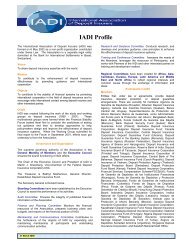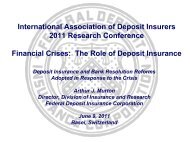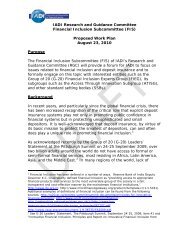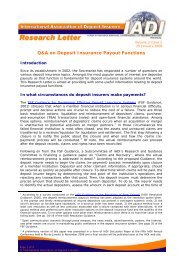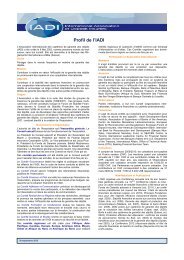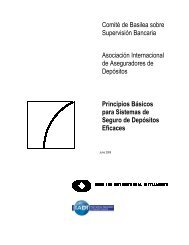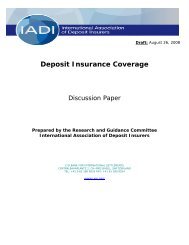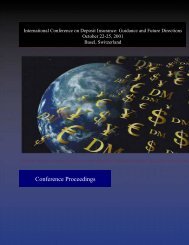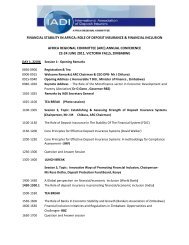Volume II - PDF - International Association of Deposit Insurers
Volume II - PDF - International Association of Deposit Insurers
Volume II - PDF - International Association of Deposit Insurers
- No tags were found...
You also want an ePaper? Increase the reach of your titles
YUMPU automatically turns print PDFs into web optimized ePapers that Google loves.
•BACKGROUND DOCUMENTS•<br />
Part I: Research<br />
avoid misunderstandings and duplicative efforts<br />
on the part <strong>of</strong> <strong>of</strong>ficials responsible for the financial<br />
sector. 3<br />
Operating procedures<br />
As a basic operating guide, the deposit insurer may<br />
consider developing bylaws or some similar document<br />
to specify its corporate governance rules<br />
clearly. Such a document should specify the manner<br />
in which the deposit insurer’s general business will<br />
be conducted and how the authorities granted to<br />
it by law may be exercised.<br />
Operating powers<br />
In order to function efficiently and effectively, a<br />
deposit insurer must be vested with certain legal<br />
authorities. The deposit insurer should have the<br />
ability to employ staff on a permanent and temporary<br />
basis so that it can adjust staffing levels<br />
quickly to address rapid changes in the level <strong>of</strong><br />
failures <strong>of</strong> insured institutions. Another issue is<br />
whether the employees <strong>of</strong> the deposit insurer should<br />
be held personally liable for the results <strong>of</strong> their<br />
<strong>of</strong>ficial actions. Holding employees personally liable<br />
for their <strong>of</strong>ficial actions may cause the employees<br />
to be reluctant to perform their <strong>of</strong>ficial duties.<br />
Therefore, some deposit insurance schemes provide<br />
indemnification for their employees.<br />
In addition, the ability to enter into contracts to<br />
obtain goods and services is an essential power that<br />
should be vested in the deposit insurer. Undue<br />
restrictions on a deposit insurer’s ability to enter<br />
into contracts can make it difficult for the deposit<br />
insurer to fulfil its responsibilities properly.<br />
Finally, the law creating the insurer should specify<br />
whether the deposit insurer can sue and be sued<br />
on its own behalf. This is a fundamental power<br />
that can be used to protect the interests <strong>of</strong> the<br />
deposit insurer.<br />
Powers needed to perform the basic<br />
deposit insurance function<br />
Control over entry and exit<br />
In setting up a deposit insurance system, it is<br />
necessary to determine what types <strong>of</strong> institutions<br />
should be insured. 4 That determination must be<br />
made after taking into account the types <strong>of</strong> existing<br />
institutions and considering the objectives <strong>of</strong><br />
the deposit insurance system. In addition, the rules<br />
for entry and exit should be clear and transparent<br />
and should establish eligibility criteria for deposit<br />
insurance.<br />
In a paybox system, decisions regarding membership<br />
in the deposit insurance scheme usually are<br />
made solely by the financial supervisory authority.<br />
In a risk-minimising system, the deposit insurer<br />
should have a role in determining which institutions<br />
are insured since the deposit insurance system<br />
bears the risk <strong>of</strong> loss when a member institution<br />
fails. A number <strong>of</strong> countries require that applications<br />
for deposit insurance be filed concurrently<br />
with the primary supervisor and the deposit insurer.<br />
Thus, institutions cannot gain deposit insurance<br />
without the approval <strong>of</strong> both entities. Alternatively,<br />
some countries require that the primary supervisor<br />
provide copies <strong>of</strong> the relevant application materials<br />
to the deposit insurer. The deposit insurer is then<br />
permitted to add its input to the application process.<br />
In order to maintain a high level <strong>of</strong> confidence in the<br />
deposit insurance system, the rules for closing an<br />
insured institution also should be clearly specified<br />
to avoid confusion over who has the authority to act.<br />
However, consideration should be given to providing<br />
the deposit insurer with the opportunity to<br />
provide input into the decision-making process. In<br />
many countries the primary supervisor has the sole<br />
power to close an insured institution. 5 In some<br />
countries, the decision to close an institution is<br />
subject to judicial review, either before an institution<br />
can be closed or subsequent to the institution<br />
being closed.<br />
101<br />
Guidance for Developing Effective <strong>Deposit</strong> Insurance Systems: <strong>Volume</strong> <strong>II</strong>



